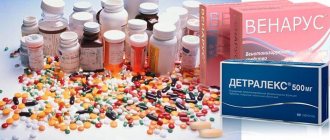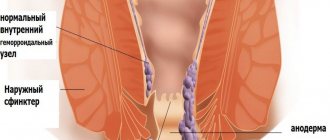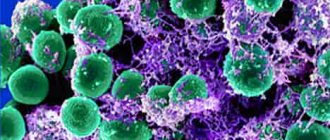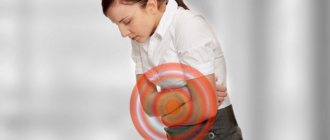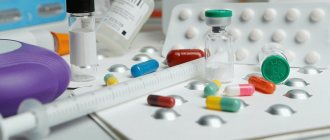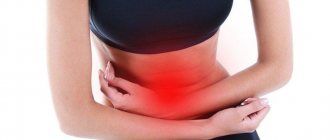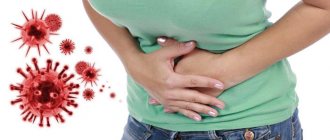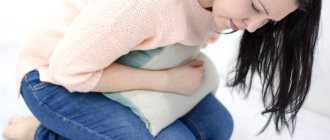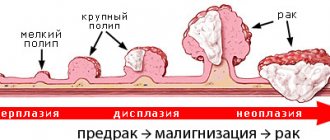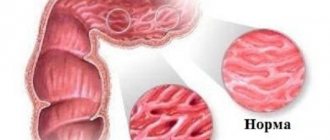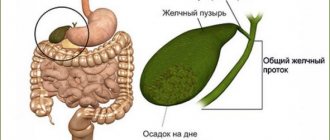Using rectal suppositories for proctitis
Rectal suppositories are a convenient form of medication designed to be administered into the rectum through the anus. For diseases of this kind, they are used to deliver the drug directly to the lesion in order to quickly achieve a therapeutic effect. Having a local anti-inflammatory and analgesic effect, they quickly eliminate symptoms and alleviate the condition.
Suppositories for inflammation of the rectum are also relevant for patients who, for certain reasons, cannot take medicine in tablets or capsules (diseases of the gastrointestinal tract, weakened or unconscious state, throat cancer). Therefore, they can only be treated by rectal administration of medications, bypassing the digestive tract.
Depending on the clinical manifestations, the nature of the ongoing process, as well as the patient’s condition, a specific type of medication is prescribed. When the mucous membrane is thinned or there are ulcerative lesions, they can be dangerous, but when the course of the disease becomes complicated and immediate action is required, preference is still given to suppositories.
Advantages
Rectal suppositories have a lot of undeniable advantages over other forms of medications:
- optimally selected combination of active components;
- quick and targeted effect of the active substance;
- high bioavailability, since there is no destruction in the gastrointestinal tract;
- reducing the risk of developing allergies due to administration directly into the rectal cavity.
Suppositories for proctitis refer to local therapy and perform a number of the following tasks:
- reduction of pain syndrome;
- regeneration of damaged tissues;
- relieving muscle spasms;
- facilitating the act of defecation;
- normalization of stool.
Flaws
Without exception, all suppositories for inflammation of the rectum are indicated for use only after consultation with a proctologist, since the wrong choice of medication or dosage contributes to the appearance of additional damage. Despite all the advantages, they have a number of disadvantages:
- Incorrect or sudden introduction of a suppository into the rectal cavity can disrupt the integrity of the inflamed mucous epithelium.
- The occurrence of discomfort and burning in the anorectal area in the first minutes after use.
- Reduced stool frequency, the appearance of constipation, alternating with diarrhea.
- Development of dysbacteriosis or progression of the inflammatory process.
Symptoms of colitis in adults
Colitis of the colon is recognized by the following symptoms:
- discomfort with pain in the lower part of the peritoneum, aggravated after medical manipulations, running, walking;
- alternating constipation with diarrhea;
- flatulence with bloating and heaviness;
- tenesmus;
- admixture of mucous-blood, sometimes purulent discharge in the stool;
- fast fatiguability.
With exacerbation of colitis, symptoms intensify, with remission they disappear. Some patients complain of dull, constant pain felt throughout the peritoneum, turning into cramping in the lower abdomen. The attacks are accompanied by the urge to evacuate or with the release of gases.
At the initial stage, colitis does not proceed unnoticed. Patients may experience rashes, impaired regularity of bowel movements, dry mouth, and thirst. The second stage of colitis occurs with fever, weakness, cramping pain, and frequent urge to defecate, especially at night. Patients with severe colitis are worried about high fever, tachycardia, and severe attacks of pain. Patients complain of uneven breathing and blanching of the skin.
In acute colitis, there is severe pain in the lower abdomen, flatulence, excessive gas formation, painful urges with discomfort during bowel movements. There are bloody spots in the stool, loss of appetite and weight, and patients suffer from diarrhea.
In chronic colitis, patients experience flatulence, false urge to evacuate, constipation, aching, dull, cramping pain, nausea, and migraine.
At the first signs of gastric inflammation, as well as the inflammatory process in the large and small intestines, it is necessary to examine the inflammatory state of the pelvic organs and gastrointestinal tract.
Review of drugs for rectal administration
Usually, the disadvantages of suppositories appear if the patient independently chooses the drug. Therefore, to prevent the development of complications and aggravation of the course of this inflammatory process, consultation with a specialist is necessary. You should also have an idea of what types of suppositories are used in the modern treatment of proctitis.
Antibacterial and antiviral
This type of medication is prescribed if an infection has caused the development of primary proctitis, or has joined as a complication. At the same time, it is necessary to take prebiotics due to the likelihood of disrupting the normal intestinal microflora. The choice of a particular drug depends on the nature of the pathogenic microorganisms.
Inexpensive and effective types of suppositories are used to treat infectious proctitis and its complications:
- "Posterizan";
- "Metronidazole";
- "Sintomycin".
Suppositories with chloramphenicol and prednisolone have been found effective for the treatment of proctitis. There are a number of similar drugs, however, they are all aimed at combating the causative agent of intestinal infection.
Do not forget that it is not recommended to select it yourself to avoid the development of unpleasant consequences.
Anti-inflammatory
For local anesthesia and relief of symptoms of the disease, painkillers and anti-inflammatory suppositories are prescribed. Popular and effective remedies include the following.
"Natalsid." It is made on the basis of brown algae extract and contains sodium alginate. Helps relieve swelling and stop bleeding, has a mild effect.
"Proctosan." It contains bufexamak and lidocaine. It has proven itself as a remedy for the treatment of proctitis, hemorrhoids, and anal fissures. Relieves inflammation, eliminates burning, itching, swelling, accelerates tissue regeneration. Has a local anesthetic effect.
"Relief". A well-known medicine containing shark liver extract. It has properties similar to the previous drug. Used to relieve inflammation, heal cracks and small wounds of the colon.
To improve regeneration
They are used in cases where the treatment of proctitis is at the final stage, and the development of complications is not observed. Activate the division of epithelial cells, which promotes rapid regeneration and healing of minor damage. This type includes candles whose names are known to everyone.
"
Ultraproct ".
Rectal suppositories for proctitis contain fluocortolone. It is prescribed for the treatment of inflammation of the rectum, external hemorrhoids, and anal fissures. Suppositories eliminate swelling, itching, have an anti-inflammatory and vasoconstrictor effect, which promotes rapid healing. " Methyluracil ". A classic remedy with a regenerating effect. Activates cell division, accelerates the restoration of mucous epithelium, strengthens local immunity, and promotes the healing of minor injuries.
" Salofalk ". Active ingredient: Mesalazine. It has a local regenerating effect on the mucous epithelium. The drug is highly bioavailable and is used in the treatment of anal fissures, inflammation of the rectum, and ulcerative colitis.
Candles with propolis and sea buckthorn . Prescribed at the final stage of uncomplicated proctitis. Natural components gently envelop the inner surface of the rectum, creating a protective layer. This speeds up the regeneration process and prevents the occurrence of new damage.
Causes
Colitis inside the colon should be treated after determining the cause of the disease, otherwise therapy will not give the expected result.
Pathology occurs for some reasons related to:
Anatomy of the gastrointestinal tract
- intestinal infection;
- impaired functioning of the gastrointestinal tract while taking medications (neuroleptics, lincomycin, laxatives have a negative effect);
- intestinal ischemia;
- unbalanced diet;
- dysbacteriosis;
- helminthic infestation;
- food allergies;
- heredity;
- poisoning
People who frequently perform enemas and uncontrollably take laxatives are at risk of developing colitis. Most often, patients experience combined colitis.
Rules of application
The maximum effect from the use of suppositories is achieved through proper procedure. To avoid possible damage, you must adhere to the following recommendations.
- Cut your nails short.
- Wash your hands thoroughly with soap or gel.
- Wear a medical glove on your dominant hand.
- Place the patient on his left side, pulling his bent knees towards his stomach.
- Open the package and remove the suppository. To prevent it from melting, it must be used quickly.
- With your free hand, push the tissues apart and insert the sharp end of the candle into the anus. Make sure it is completely pulled in.
- Squeeze the buttocks and hold in this position for 10-15 minutes until the composition dissolves and is absorbed.
- When the urge to defecate occurs, the patient should breathe deeply and evenly, while simultaneously performing stroking movements on the abdomen.
- After the discomfort passes, you can get up from the couch.
Classification
Pathology is classified according to severity:
- acute – severe symptoms that occur suddenly;
- chronic – slow development of pathology with blurred symptoms, similar to signs of other diseases in gastroenterology.
Colitis occurs in several types:
Pain due to illness
- A nonspecific form of ulcerative colitis - the disease develops against the background of an inflammatory reaction of the intestine. A weakened immune system does not function fully, which causes damage to intestinal tissue. Patients feel pain in the peritoneum (on the left side), after bowel movement the syndrome becomes less noticeable. The disorders have a necrotic character. It is recommended to remove food allergens from the diet to alleviate the patient’s condition.
- The erosive form is inflammation of the gastric lining near the duodenum. The disease manifests itself as multiple ulcers on the duodenum near the stomach.
- The catarrhal form of colitis is the stage of inflammation in the mucous membrane of the large intestine. Patients experience redness of the intestinal walls with swelling, narrowing in the lumen, which leads to the formation of cracks. Inflammation occurs both partially and over the entire surface of the intestine.
- Diffuse form - observed in combination with other forms of colitis.
- The atrophic form of colitis is inflammation of the large intestine, causing thinning of the walls of the organ.
Pathology occurs in people who do not lead a healthy lifestyle and pay little attention to their diet. Experts call this disease irritable intestinal syndrome. Most often, a chronic course of pathology of the mucous tissues of the colon is diagnosed.
The disease can flare up after prolonged consumption of soda, strong coffee, alcoholic beverages, unhealthy foods, or against the background of gastroenteritis.
The occurrence of ulcerative colitis is characterized by purulent-hemorrhagic inflammation in the colon with the systemic development of local complications. The causes of ulcerative colitis have not been studied to date. Doctors believe that the provocateur for the disease is an unbalanced diet, infection, medications used, genetic mutation, stress, and dysbiosis.
The effectiveness of suppositories in the treatment of proctitis
Treatment of the disease is complex and involves the use of other methods such as gymnastic exercises, dietary nutrition, and in advanced forms – surgical intervention.
Experts classify proctitis therapy with suppositories as auxiliary and alternative methods. In most cases, with their help it is possible to achieve a quick therapeutic effect, however, there are situations when they may be contraindicated.
Therefore, the opinion that rectal suppositories are an independent therapeutic measure is erroneous. The use of this dosage form depends on each specific situation, and the question of the advisability of its use is decided only by the doctor.
Diagnostics
If the form of the pathology is correctly determined, the result of colitis treatment is positive.
To recognize the extent of the disease, a number of research activities are required:
Diagnostic tests
- Testing stool for protozoan parasites.
- Colonoscopy, sigmoidoscopy - detection of catarrhal and trophic changes in the intestinal mucosa.
- X-ray or irrigography - assessment of the intestinal structure with determination of the localization of the lesion.
- Coprology – testing the functioning of the digestive tract and metabolic processes.
Types of pathology
Depending on the nature of the damage to the mucous membrane, the pathology in question is divided into several types:
- Catarrhal. It occurs mainly when the rectum is exposed to irritating substances. The pathology is characterized by swelling of the mucous membrane, the formation of small hematomas and pustules on the walls. It is also possible to increase the volume of mucus secreted. The appearance of pustules is often provoked by pathogenic microorganisms.
- Polypous. The main sign of the formation of a polypous form of proctitis is the appearance of polyps, or benign growths, in the rectum.
- Erosive. It usually occurs with a long course of the pathology. The erosive appearance is characterized by thinning of the superficial layer of the intestine.
- Ulcerative. This form of the disease is characterized by the appearance of deep erosions affecting the muscle fibers of the rectum.
- Mixed. Occurs due to the influence of several provoking factors.
Possible side effects
In addition to individual intolerance reactions, sometimes suppositories can cause other side effects . This is usually due to the wrong choice of drug or exceeding the recommended dosage. Most often this is diarrhea and increased inflammation of the intestinal walls. There may be irritation and redness of the skin around the anus.
In very rare cases, these side effects may occur:
- headache;
- dizziness;
- cardiopalmus;
- liver dysfunction.
